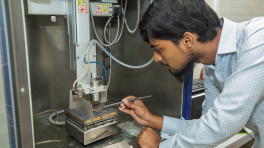Antibodies decline in 6 months of taking Covid booster: Study

Antibodies begin to decline, on average, six months after receiving a booster dose of the Covid-19 vaccine.
However, antibody levels are elevated in those with a history of Covid-19 infection, according to a recent study of Bangabandhu Sheikh Mujib Medical University (BSMMU).
After one month of taking the booster, antibodies were found in the blood of all the participants of the study and the level of the antibodies stood at 20,878 AU/mL, having increased in almost all the participants' bodies.
However, six months after receiving the booster, antibody levels decreased to 10675.7 AU/mL, found the study titled: Antibody Titre Six Months after Third Dose of Vaccination against SARS-Cov-2.
Among the participants of the study, those with a history of Covid-19 infection had higher levels of antibodies, though no significant changes were observed in other blood parameters (haemoglobin, platelets, etc.).
The study was conducted by the Haematology Department of the BSMMU.
Previous studies have shown that one month after taking the first and second doses of the Covid-19 vaccine, 98% of 223 people had antibodies, said Prof Sharfuddin, vice chancellor (VC) of BSMMU, at a press conference on Monday (22 August).
The VC also said sufficient antibodies were not found in the bodies of two vaccine recipients.
The World Health Organization and the governments of the respective countries would decide whether those who had received a booster dose should take a fourth dose due to the diminishing antibody levels, he said at the press conference.
Separately, Bangladesh reported one death and 178 cases from Covid-19 in the last 24 hours till 8:00 am Monday.
The positivity rate was recorded at 3.15% during the same period, testing 5,656 samples across the country.
So far 29,316 people have died and 20,10148 tested positive for the virus in Bangladesh since 2020.


 Keep updated, follow The Business Standard's Google news channel
Keep updated, follow The Business Standard's Google news channel














